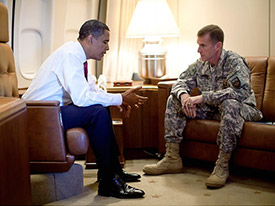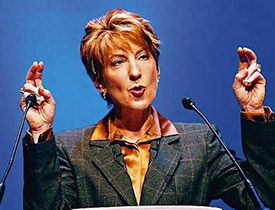‘I didn’t know the mic was on’: Public Talk v. Private Talk
The recent flap over the inopportune comments by General Stanley McChrystal and his staff in the presence of and even directly to a Rolling Stone magazine journalist, and the ensuing hue and cry “off with their heads” for what amounts to something akin to alcohol-fueled barroom B.S.ing and locker-room boys-will-be-boys jock talk, affords an opportunity to distinguish between public talk and private talk.

Private talk is what we say in private to our spouses, family, friends, and colleagues when there is a presumption of privacy such that one’s comments will not go public. Public talk is what we say when we want to make a formal statement or declaration with the intention of and responsibility for what was said. Too often we confuse these two very different forms of expression. Everyone is treating the private talk of McChrystal and his staff as if it were intended for public consumption. It is almost as if McChrystal had held a press conference and issued a formal public statement that Joe Biden’s new name is “bite me.” Surely we should recognize the vast gulf that exists between these two types of talk, and no one would want to insist that all private talk be held as if there were a microphone in the room that was on and broadcasting. Locker rooms and barrooms would go deadly silent.

Something similar happened to California Senatorial candidate Carly Fiorina the day of the primary election, when she was caught mocking the hair of her rival Sen. Barbara Boxer when she thought that her microphone was off, continuing with her private talk about Fox’s Sean Hannity and the cheeseburgers she wished she had eaten the night before.
And let’s not forget last year’s “climategate” flap in which the public discovered that scientists—shock of all shocks—are people who in private talk like everyone else, making fun of colleagues they don’t like, dissing rivals and competitors, and speaking colloquially as if they were not scientists investigating one of the most politically charged scientific issues of the past century—anthropogenic global warming.

On the other hand, if you are a General in charge of executing a war, a Senatorial candidate with aspirations of being one of the handful of people who can actually influence public policy, or a scientist who data and theory could alter entire economies for decades or even centuries, your private talk is not the same as that of everyone else’s. McChrystal knew he was talking to a Rolling Stone reporter, so as the head of hundreds of thousands of combat troops under the ultimate direction of the Commander-in-Chief at 1600 Pennsylvania Ave., he should have been able to filter out his private talk. Ditto Carly Fiorina who, if she wins the Senate seat of a state whose economy rivals that of most countries, is bound to sit before microphones on almost a daily basis, so if she cannot discriminate between public and private talk now, had damn well better learn the difference. Likewise scientists whose opinions on climate change are used by politicians and policy makers worldwide to shape the direction of economic reform, have an obligation to presume that much of their private talk will be used publicly against them (and their recommendations) by those who disagree.
In other words, if you are in a position of power and influence, assume that the microphone is on.

If public figures censor themselves, is that good for the public figures or for the public? BP’s internal e-mails regarding the “nightmare well” aren’t good for BP, but releasing them was in the public interest.
This happens all the time in the private sector, though, too. We seem unable to accept that our Facebook pages are public and we shouldn’t badmouth our boss if she/he is a “friend.”
I agree, though, that we are often tough on those who speak privately but whose words are discovered publicly. Then again, perhaps we are more upset by the public aspect of it than the actual message being shared, in the same way that we are horrified when someone on public transit is yelling in their cell phone about child custody or sexual issues (insert expletives throughout).
Are we becoming less aware of the boundaries? Or are public figures making mistakes in the same way they always have, but the mics are more sensitive?
“Are we becoming less aware of the boundaries? Or are public figures making mistakes in the same way they always have, but the mics are more sensitive?”
The case that jumps to my mind is Reagan joking that “We begin bombing in five minutes.”
“Everyone is treating the private talk of McChrystal and his staff as if it were intended for public consumption.”
Any public figure that doesn’t understand that anything they say in the presence of a reporter is not “private talk” shouldn’t hold that office.
And if you don’t understand that a general at that level is more politician than warfighter, then you don’t understand the military.
Yes, of course people in all walks of life do say things privately that they don’t want broadcast. McChrystal and staff were, however, obviously not thinking about the media’s history of a penchant (perhaps raison d’etre) for revealing and enhancing anything and everything about anybody that can be construed in any way as negative, and therefore, sensational… they should have been, as should all persons in public life.
Information that is actually in the public interest is another thing entirely.
You’d think a spec ops guy would know how to keep his mouth shut. Spec ops officers would agree.
http://www.armytimes.com/news/2010/06/tns_reaction_062210/
How can you write an article on this without mentioning Gordon Brown?
http://news.bbc.co.uk/2/hi/8649012.stm
The reason people tend to treat private talk as public talk, is because private talk has the tendency to reveal what people really think beneath their façade.
As such, telling public figures to assume that the microphone is always on is downright irresponsible. Instead, we should keep quiet about it and hope that it slowly sinks away in the marshes of memory, allowing some politician or other to be caught off guard again.
The only thing I can add to this discussion is that when I was a soldier about to “liberate” Iraq we were cautioned about reporters. Basically that with reporters “nothing is off the record” even when requested it not be. I do believe that having served under Gen. Mc Chrystal he is smarter than this. Either he made a costly one-time gaff or his comments are part of a bigger plan. I think it’s the latter.
Don’t tell anyone, but I suspect a set-up too.
It has been said about McChrystal that he had a history of testing the limits of what is acceptable. Maybe he really did think he could get away with it just one more time.
I think that would be a fair statement. I know when I was newly promoted I would see just how far the rank would let me go. I just think this whole situation is bizarre.
Hacking in to someone’s email account, and cherry picking the messages that suit your argument isn’t even in the same ballpark as politicians and military generals making statements in a room full of reporters…
Yes! Dr Schermer’s lumping of these together baffled me.
The “Climate-gate” e-mails would be much closer to bugging McChrystal’s quarters than to his comments made in front of a reporter. Geesh.
Shermer presented three ways that private talk was made public. McChrystal’s gaffe was intentional, Fiorina’s was accidental, and Climategate was either a hack or a leak. But even if the Climategate e-mails hadn’t been hacked or leaked, they could’ve been released to meet a FOIA request.
They were hacked in the UK. Does the UK have to obery FOIA requests?
The Uk has their own FOIA. The CRU was being flooded with FOI requests prior to the ‘hack job’. That was one of the things that was irritating the researchers,and causing them to be on the defensive.
Before you flap your gums it might have been interesting to see/hear what the editor of the Rolling Stones has to say. 21 minutes into http://www.charlierose.com/view/interview/11083.
I agree with everything you wrote here, but I’m not sure how it relates to critical thinking/skepticism.
Frankly he hasn’t written anything related to skepticism here, in general. It’s always libertarian biased articles on economics, or a name-dropping session from a dinner he had.
Since the article came out, Rolling Stone and the reporter who broke the story, Michael Hastings, have come under attack in the mainstream media for violating the so-called “ground rules” of journalism. Incredible, here is doing what jurnalists should do, expose politicians and people in power. The mainstream media is blaming it on a “product of the culture of exposure.” Astounding, they are basically saying that journalist should not in any way reveal to the people what the people who run the country really thinks, only to tell the “public talk” (i.e. the lie)
Journalists do have a code of ethics that should prevent them from reporting what’s said off the record. But AFAIK, Hastings didn’t violate any rules, and McChrystal hasn’t complained.
I agree with one previous poster, that it is irresponsible to “remind” public figures that the microphone is on. Whether it is a substantive issue or just a comment about someone’s hair, anything that lets the fundamental hypocrisy, ignorance, or pettiness of politicians show through is a good thing.
I’ve always been one of those people willing to say that “the emporor has no clothes”. That trait hasn’t always endeared me to the “emporors” involved but sometimes things need to be said and I’ve said them when I determined the risk was acceptable (e.g. lose my job… find another one).
I think this applies in a couple of ways to the General McChrystal case. Although the majority of comments came from his staff members and not directly from the General himself, one suspects that he was aware of the situation. My reading then is that he wanted this attitude to be known. Secondly, from the standpoint of the President, Mr. Obama needs to know what’s going on in the minds of his top generals and their staff. As mentioned by others above, we don’t serve ourselves well by hiding the discontent or the real intentions.
Should the President surround himself with a bunch of sycophant “yes-men” for generals? Well, he made his choice and canned McChrystal but I’m not sure it was the most rational choice.
There is an enormous difference between a sycophant and a subordinate who never criticizes a commander in inappropriate situations.
Anyone who has made his or her way up to the rank of General knows that leaders must publicly stick together or the chain of command breaks.
Also, officers are responsible for the conduct of their subordinates.
The question here is did McChrystal and his staff expose the true incompetence of Obama, Biden and the White House and in turn confirm what the public should have already known. And now Obama is ordained as brilliant for selecting a replacement he never agreed with at any time when working for Bush?
It is a strange world…..
McChrystal should ask for whistleblower protection, LOL.
Um… their comments were not all honest appraisals of
competence – most were just pissing about civilian bosses.
Mainly it was lack of military discipline (and judgment)
that was exposed. When these officers did that to their
superiors they eroded their own authority – their subordinates
would have less respect for them because they displayed their
lack of respect for their commanders.
They had to be removed because after that they’d be less
effective leaders.
Any time an executive fires someone he hired, it reflects poorly on the executive.
Are you suggesting that Obama “hired” a 4 star general that has been in the military for his entire adult life? Really?
No, Obama promoted a 3 star general to command the ISAF.
Agreed.
Further, when a subordinate screws up it reflects poorly the leader. That’s part of being a leader: you’re responsible for your actions plus your subordinates’ actions. (If you don’t want that responsibility then don’t be a leader!)
McChrystal was responsible for the statements of his staff – it was his job to keep his guys in line and he failed. But sh!t rolls up hill: It was ultimately Obama’s job to see to it that his staff was on top of things and ensured that those who answer to them did their jobs effectively.
Faulty leadership at multiple levels. Not a good thing.
The persons who operate mics are to ensure that the person on whom it is pinned knows whether it is on or not. Don’t tell me that a mic operator has the power to destroy an entire career in a split-second by the touch of a simple switch and the the world never question who should have been responsible for ensuring that people in responsible position are not derailed by a single misstatement. The mic man or woman but feel the weight of that responsibility.
In California, it’s illegal to record conversations without the participants’ consent.
I think General McCrystal’s remarks were as calculated as that senator shouting: “You Lie”, during Obama’s State of the Union speech. It earned them respect from the tea baggers. The rude senator was cashing in on his ejaculations the very next day when money started pouring into his campaign fund.
Its’ an even bet we will see McCrystal running for public office now that he has established his tea bagger credentials. He is even a martyr for the right since he was forced to resigned over the issue.
Does anyone see the hypocrisy of conservatives who would have apoplexy if a general had dissed President Bush yet believe President Obama to be unfair when he disciplines McCrystal?
A hard lesson I learned when I was in the military, was that I was on duty 24 hours a day and I should never speak ill of a superior or their orders.
The remarks of McCrystal and his staff were definitely for public consumption, but they are smart people, with Rolling Stone’s article comes plausible deniability. “Wait…what? Are you saying reporters publish the answers I give them during interviews?”
Dr.Shermer, I’m surprised to see you so far off base.
For the vast majority of people the mic on or off is much more subtle, we are not promoting a public persona for general consumption or attempting to sway public opinion. Then again we often have to get along with people we do not want be around, at school, on projects at work etc. Not say what we really feel, even speak well of them for the good of a cause or for an end goal.
I do not think it is any different it is just that the results are public or publicly debated for these people. None of us would likely perform any better, probably worse in similar circumstances.
Anyway… given the fact this happens.
The position that one should speak as if the mic is always on, has me wondering how can someone actually accomplish this? It would be no small feat if not impossible.
Does that assume that the person speaking must always say what they believe at all times? Therefore, they would never slip up and say the wrong thing, the problem is it may not align with the goals they wish to achieve. Some public lies may be required to make partnerships work or garner the support of the majority.
Perhaps that a person in the limelight must be “always on” always voicing their public position or defending it regardless of what they really felt? Likely end in a breakdown of some type, no one could keep this up indefinitley.
The easiest would be to have the speaker consider who can they trust? So, anytime there is the possibility of a mic around there is none to be trusted. Here however, we are back to being victims of ubiquitous technology that is always on everywhere we go.
The other side is we can hope for enlightenment of the masses who understand the subtlties, who will see through the media circus and not pick sides rather be more accepting of these situations. Ya, that is not going to happen at all.
Signed,
ye of little faith
awC
awC